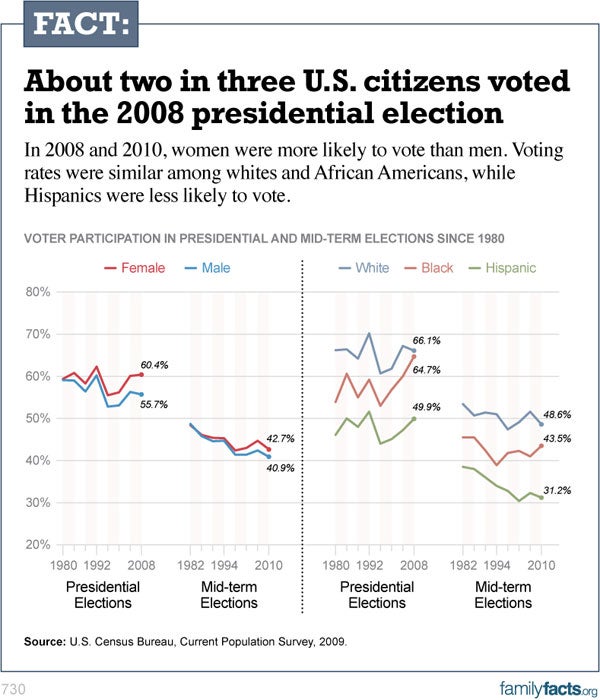Family Fact of the Week: Americans Take to the Polls on Marriage and Life
Sarah Torre /
Whatever the outcome of today’s elections, Americans can be sure of nonstop electoral analysis and number crunching from pundits and pollsters for at least the next few weeks. Charts and maps and graphs will plot who voted and how they cast their ballots. If past data is any indication, however, we can be sure that at least a majority of Americans will venture to the polls.
As data on Heritage’s FamilyFacts.org shows, a majority of Americans have taken the time to vote in presidential elections over the past three decades, with roughly two in three U.S. citizens casting votes in the 2008 election cycle. This year, as in many other elections, bridging the “gender gap” and garnering the vote of American women has been a major focus of both presidential candidates’ campaigns. According to FamilyFacts.org, women were more likely than men to cast ballots in both the 2008 and 2010 elections. Over 60 percent of female citizens voted in the 2008 presidential election, while just over 55 percent of men did the same. (continues below chart)
For many Americans who will participate in the democratic process this week, the choices before them go beyond just a selection of local, state, and federal leaders who will make future policy. Voters in a large majority of states will have the opportunity to voice their support or approval for ballot measures that could have immediate policy impacts on their families and communities. Those decisions will range from approval of municipal projects to the use of taxpayer dollars for elective abortion to the definition of marriage in state statutes and constitutions. Below are just a few of the ballot measures before voters today that could have immediate policy ramifications:
Marriage
- In Maine, voters will consider a ballot initiative to issue marriage licenses to same-sex couples and render gender-neutral any terms in the state’s laws relating to marital and familial relations.
- In Minnesota, voters will consider whether to amend their state constitution to preserve the definition of marriage between one man and one woman. Same-sex marriages are currently prohibited under MN statutory law.
- In Maryland, citizens will consider a ballot initiative to ratify or reject the same-sex marriage measure adopted by the Maryland legislature and signed into law earlier this year. The Maryland ballot initiative gathered more than 113,000 signatures, more than twice the number needed to put a question on the ballot in the state of Maryland.
- In Washington state, in response to a legislatively passed bill last year that would have legalized same-sex marriage, traditional marriage supporters in the state responded by obtaining more signatures than needed for a voter referendum on the law. Tomorrow, voters will approve or reject the law and decide whether the state will allow same-sex marriage.
Learn more about the state marriage ballot initiatives:
- Reflecting on the Marriage Question by Ryan Anderson, November 4, 2012
- Summer of Intolerance Regarding Same-Sex Marriage Bleeds into Fall by Dominique Ludvigson, October 17
- Circumventing Citizens on Marriage: A Survey by Dominique Ludvigson, October 10, 2012
Parental Consent of Minors’ Abortions
- In Florida, citizens will have the opportunity to accept or reject a proposed amendment to the state constitution regarding abortion. If accepted, the amendment would do two things: 1) prevent Floridians’ tax dollars from being used to fund elective abortions, unless required by federal law and 2)allow for future legislation requiring parental consent before a minor’s abortion procedure by overruling an earlier Florida Supreme Court decision that struck down such laws.
- In Montana, voters will consider whether to require parental notification before an abortion is performed on a minor under 16 years of age. Currently, Montana is one of the few states that does not require at least some parental involvement in the decision of a minor to have an abortion.
Physician-Assisted Suicide
- In Massachusetts, voters will decide whether to accept or reject a proposed law that would allow physicians, at a patient’s request, to prescribe a lethal dose of medication if the patient was given less than six months to live by two doctors. The issue of physician-assisted suicide has drawn high-profile commentary in recent weeks. Victoria Kennedy, an attorney and widow of Senator Ted Kennedy (D-MA), who died after a battle with brain cancer, recently voiced her opposition to the practice and bioethicist Ezekiel Emanuel, M.D., dispelled some common myths about doctor-assisted suicide in The New York Times last week.
Recognizing the unique and important right afforded U.S. citizens to participate in free elections, many Americans are expected to cast votes in this year’s presidential election. Whether it’s selecting policymakers and leaders or deciding deeply important questions like the definition of marriage and parental involvement in minors’ decisions, the ability of citizens to freely engage in the democratic process without fear of reprisal is vital for maintaining civil society.


